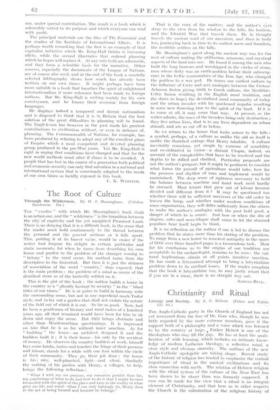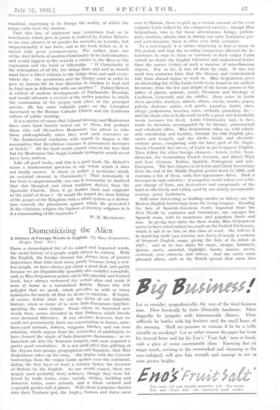Christianity and Ritual .
TliE Anglo-Catholic party in the Church of Iingland has not yet recovered from the loss of Dr. Gore who, though' he was little regarded by the more extreme members, gave it the support both of 'a philosophy and a voice whieh was listened to by the country at large. • Father Hebert is one of the theologians who may fill the gap. He has at least the quali- fication of wide learning, which includes an intimate knbw- ledge of modern Lutheran theology, a reflective mind, clear. style, and obvious sincerity. The outlines of the new Anglo-Catholie apologetic are taking shape. Recent study of the history of religion has tended to emphasize the central importance of ritual in the ancient civilizations and its close connexion with myth. The relation of Hebrew religion with the ritual system of .the culture of the Near East s has been shown to. be closer than was formerly supposed. A ease can be made for the view that a ritual is an integral. Clement of Christianity, and that here as in other respects the Church is 'the eulmination of the religious history of
mankind, expressing in its liturgy the reality of which the Pagan cults were the shadow.
That this line of argument may sometimes lead us to conclusions which give us pause is realized by Father Hebert, as we may observe if we ponder his remarks on Lourdes, but unquestionably it has force, and in the book before us it is stated with great persuasiveness. The author finds one of the chief defects of modern Christianity in its individualism, and would suggest as the remedy a return to the Mass as the expression and the bond of fellowship. " If Christianity is the redemption of all life, the things done and said in church must have a direct relation to the things done and said every- where else ; the sacraments and the liturgy exist in order to give to human life its true direction in relation to God and to bind men in fellowship with one another." Father Hebert
is critical of modern developments of Eucharistic Worship, and would advocate a revival of the earlier practice in which
the communion of the people took place at the principal service. He has some valuable pages on the Liturgical movement in the Roman Catholic Church and the Lutheran reform of public worship.
It is a matter of course that Liberal theology and Modernism have some hard knocks meted out to than, but perhaps those who call themselves Modernists can afford to take them philosophically when they read such sentences as
" the fundamental confusion with regard to dogma is the assumption that Revelation consists in guaranteed doctrines or beliefs." All the hard words cannot conceal the fact that but for Modernism this Anglo-Catholic apologetic would never have been written.
Like all good books, and this is a good book, Mr. Hebert's raises a fundamental question in our minds which it does not finally answer. Is ritual, or rather, a particular ritual, an essential element in Christianity ? That historically it has been is unquestionable, nor can it reasonably be doubted that this liturgical and ritual tradition derives from the Apostolic Church. Does it go further back and originate in the mind of Jesus ? Or would He regard the close linking
of the gospel of the Kingdom with a ritual system as a declen- sion towards the pharisaism against which He protested ? Is the Christian religion the highest of mystery religions or is it a transcending of the mysteries ? W. K. MATFUEWS.











































 Previous page
Previous page